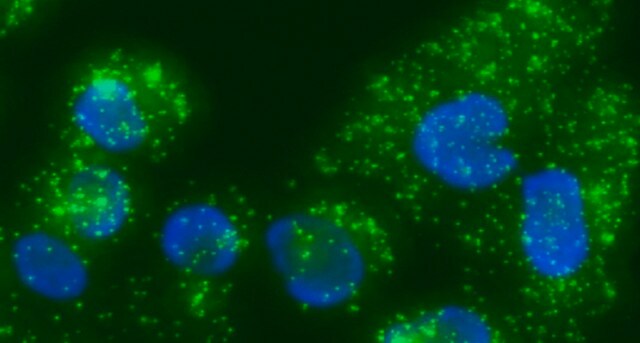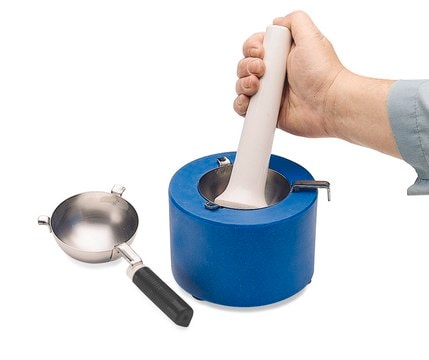おすすめの製品
由来生物
mouse
品質水準
抗体製品の状態
purified antibody (Protein G-Sepharose)
抗体製品タイプ
primary antibodies
クローン
4G10®, monoclonal
製品種目
Duolink®
化学種の反応性
all
テクニック
proximity ligation assay: suitable
適合性
suitable for brightfield
suitable for fluorescence
輸送温度
wet ice
保管温度
2-8°C
詳細
Anti-Phosphotyrosine antibody, clone 4G10® with the Duolink PLA PLUS oligonucleotide. This antibody detects tyrosine phosphorylated proteins in all species. Protein target specificity can be obtained by pairing with an antibody specific to a protein of interest in a Duolink PLA experiment. This product must be used in combination with a MINUS PLA probe of a different species or another directly-conjugated primary antibody with a MINUS PLA oligo. The Anti-mouse PLA probe PLUS (DUO92001) is not necessary when using this product.
特異性
This directly-conjugated primary antibody PLA probe recognizes tyrosine-phosphorylated proteins from all species.
アプリケーション
Duolink® proximity ligation assay(PLA®) allows for endogenous detection of protein interactions, post translational modifications, and protein expression levels at the single molecule level in fixed cells and tissue samples.
This product can be applied to both the Duolink® In Situ Fluorescence Protocol and the Duolink® In Situ Brightfield Protocol depending on the detection reagents used.
Visit our Duolink® PLA Resource Center for information on how to run a Duolink® experiment, applications, troubleshooting, and more.
To perform a complete Duolink® PLA in situ experiment you will need two primary antibodies (PLA, IHC, ICC or IF validated) that recognize two target epitopes. Other necessary reagents include a pair of PLA probes from different species (one PLUS and one MINUS), detection reagents, wash buffers, and mounting medium. Note that the primary antibodies must come from the same species as the Duolink® PLA probes. Analysis is carried out using standard immunofluorescence assay equipment.HRP is also available for brightfield detection.
Application Note
Protein phosphorylation is considered as one of the key steps in signal transduction and regulation of enzymatic activity. Anti-phosTyr antibodies are commonly used in western blots after the targeted proteins have been immunoprecipitated to measure the tyrosine phosphorylation of the protein of interest. This process is time-consuming and cannot provide subcellular localization.
Anti-phosTyr PLA probes are used to detect the phosphorylation of tyrosine residues in proteins. Protein target specificity can be obtained by pairing with an antibody specific to a protein of interest in a Duolink® PLA® experiment. This product is particularly useful when site-specific anti-phosphorylation antibodies are not available. A MINUS PLA probe of a different species or another directly-conjugated primary antibody with a MINUS PLA oligo must be used in combination with this product. The Anti-mouse PLA probe PLUS (DUO92001) is not necessary when using this product. See our Product Selection Guide for more information.
Let us do the work for you, learn more about our Custom Service Program to accelerate your Duolink® projects
This product can be applied to both the Duolink® In Situ Fluorescence Protocol and the Duolink® In Situ Brightfield Protocol depending on the detection reagents used.
Visit our Duolink® PLA Resource Center for information on how to run a Duolink® experiment, applications, troubleshooting, and more.
To perform a complete Duolink® PLA in situ experiment you will need two primary antibodies (PLA, IHC, ICC or IF validated) that recognize two target epitopes. Other necessary reagents include a pair of PLA probes from different species (one PLUS and one MINUS), detection reagents, wash buffers, and mounting medium. Note that the primary antibodies must come from the same species as the Duolink® PLA probes. Analysis is carried out using standard immunofluorescence assay equipment.HRP is also available for brightfield detection.
Application Note
Protein phosphorylation is considered as one of the key steps in signal transduction and regulation of enzymatic activity. Anti-phosTyr antibodies are commonly used in western blots after the targeted proteins have been immunoprecipitated to measure the tyrosine phosphorylation of the protein of interest. This process is time-consuming and cannot provide subcellular localization.
Anti-phosTyr PLA probes are used to detect the phosphorylation of tyrosine residues in proteins. Protein target specificity can be obtained by pairing with an antibody specific to a protein of interest in a Duolink® PLA® experiment. This product is particularly useful when site-specific anti-phosphorylation antibodies are not available. A MINUS PLA probe of a different species or another directly-conjugated primary antibody with a MINUS PLA oligo must be used in combination with this product. The Anti-mouse PLA probe PLUS (DUO92001) is not necessary when using this product. See our Product Selection Guide for more information.
Let us do the work for you, learn more about our Custom Service Program to accelerate your Duolink® projects
特徴および利点
- No overexpression or genetic manipulation required
- High specificity (fewer false positives)
- Single molecule sensitivity due to rolling circle amplification
- Relative quantification possible
- No special equipment needed
- Quicker and simpler than FRET
- Increased accuracy compared to co-IP
- Publication-ready results
法的情報
4G10 is a registered trademark of Upstate Group, Inc.
Duolink is a registered trademark of Merck KGaA, Darmstadt, Germany
PLA is a registered trademark of Merck KGaA, Darmstadt, Germany
適切な製品が見つかりませんか。
製品選択ツール.をお試しください
保管分類コード
12 - Non Combustible Liquids
WGK
WGK 2
適用法令
試験研究用途を考慮した関連法令を主に挙げております。化学物質以外については、一部の情報のみ提供しています。 製品を安全かつ合法的に使用することは、使用者の義務です。最新情報により修正される場合があります。WEBの反映には時間を要することがあるため、適宜SDSをご参照ください。
Jan Code
DUO87009-PH:
DUO87009-50UG-PW:
DUO87009PROC:
DUO87009-VAR:
DUO87009-50UG:
DUO87009-BULK:
DUO87009-VAR-PW:
試験成績書(COA)
製品のロット番号・バッチ番号を入力して、試験成績書(COA) を検索できます。ロット番号・バッチ番号は、製品ラベルに「Lot」または「Batch」に続いて記載されています。
ライフサイエンス、有機合成、材料科学、クロマトグラフィー、分析など、あらゆる分野の研究に経験のあるメンバーがおります。.
製品に関するお問い合わせはこちら(テクニカルサービス)






